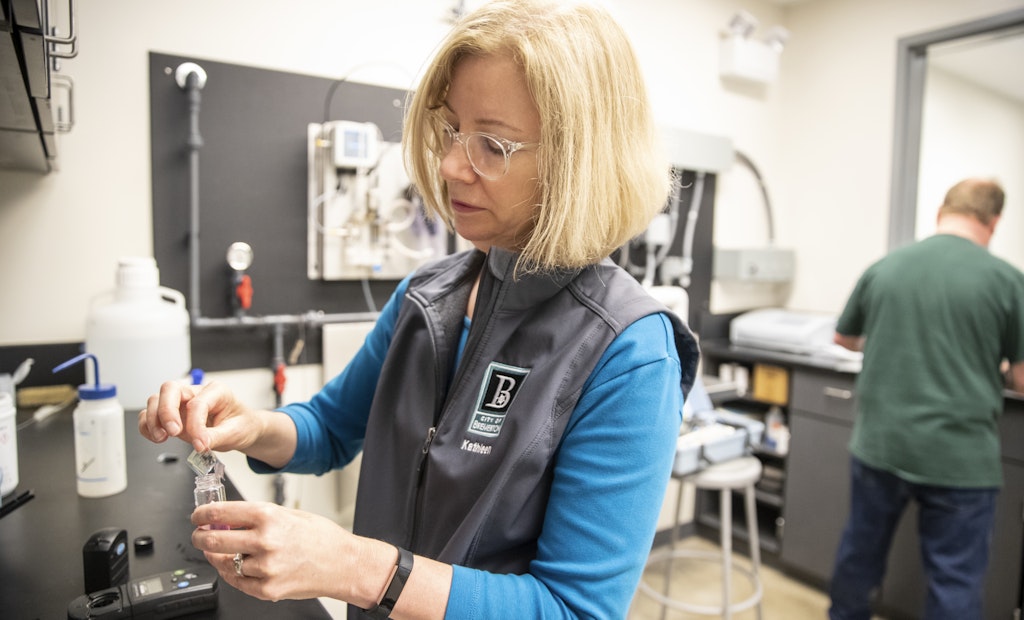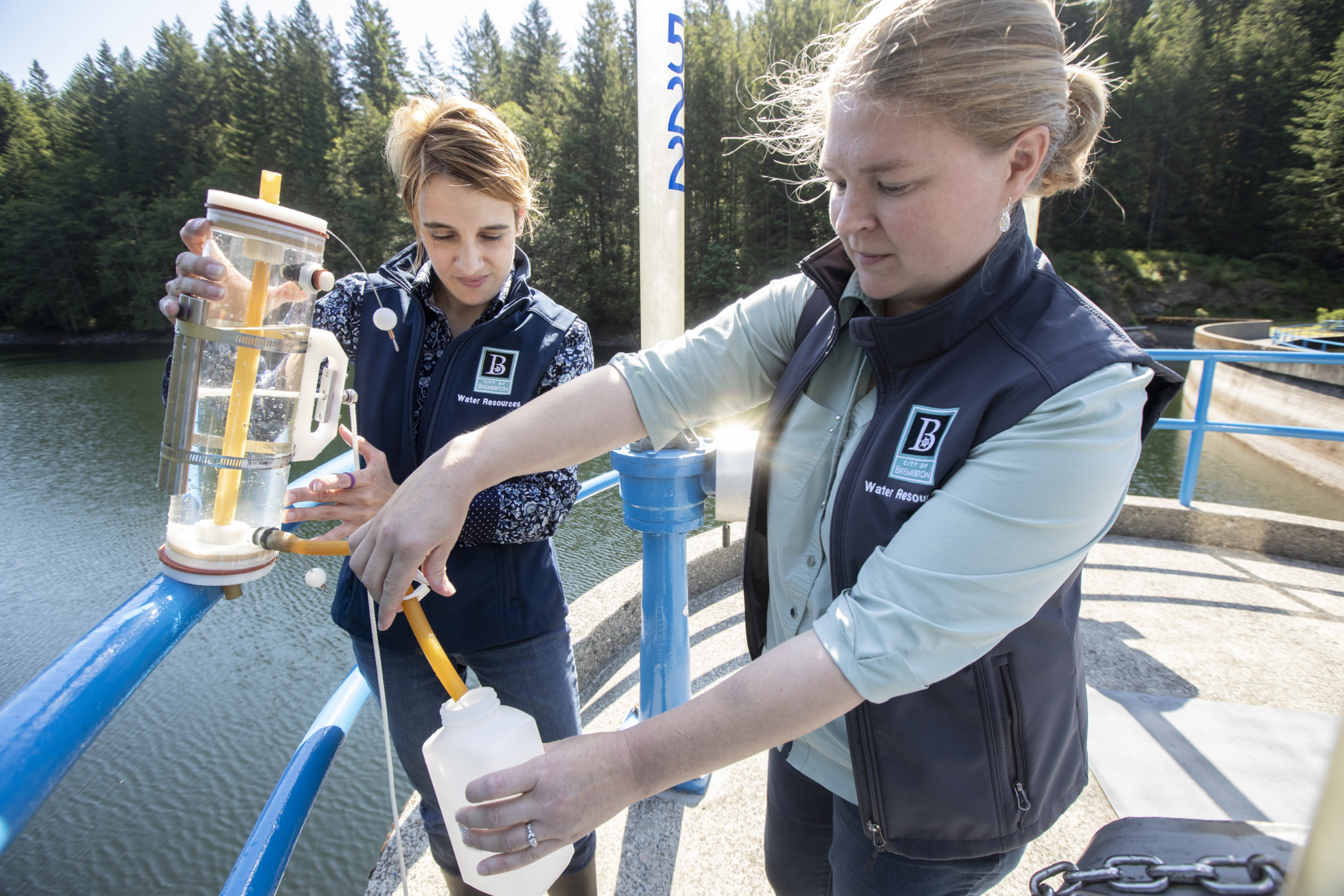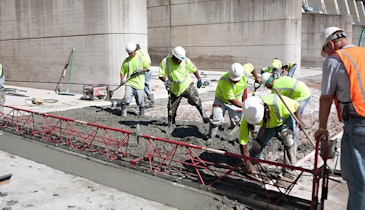
Kathleen Cahall is retiring after 27 years as water resources manager for the city of Bremerton, Washington. (Photos By Stephen Brashear)
When Kathleen Cahall was a high school student in Dayton, Ohio, her advanced chemistry class focused on environmental issues including water quality. As the class progressed, Cahall says she came to understand that she had found her professional life’s work. She went on to earn a college degree in biology with an emphasis on environmental issues and a master’s degree in public health.
In June, as she neared retirement after 27 years as water resources manager for the city of Bremerton, Washington, Cahall expressed concern that too few young careerists in today’s workplace share her interest in public utility work. The idea came to her rather clearly when the city had to advertise a second time to attract candidates for the job she was leaving. “We are having a bit of difficulty filling my position.”
Cahall blames the relatively low level of interest in the job on the low-profile nature of both the office and the work. “Our field is not as visible as some other fields,” she says. “Some people don’t know these jobs exist, or how rewarding and how stable our jobs are. It’s a little bit a case of out of sight, out of mind.”
Half the water workforce will soon disappear
The situation is more critical than just attracting a qualified person to the open Bremerton water resources position. An estimate voiced among Washington state health officials is that 50 percent of state-certified water professionals will retire in the next 10 years. Chris McCord, deputy director of central services in the state health department’s Office of Drinking Water, says the 50 percent estimate is based on several sources.
He says that in 2008 the American Waste Water Association and the Water Environment Federation commissioned a study of the public water and wastewater sector workforce. “In 2014, the issue came front and center for us in the regulatory world as we began to hear about it in our training, see it in the renewal process, and highlight it in our Drinking Water weekly awards program.”
McCord recalls a presentation he did before an audience of about 75 drinking water professionals. “I had them all stand up. I then asked for those eligible to retire in one year to sit down, then those eligible to retire in five years to sit down, and then those in 10 years. We were left with 12 people standing. That obviously is more than 50 percent, but I began to provide the 'guesstimate' of 50 percent at that point. Since then, the workforce issue has been a large part of my thinking and activity.”
Deni Gray confirms the rough outline of the problem. Gray heads Washington state’s Department of Health certification program for water works operators. She says the health department has been concerned for some time about the scarcity of operators. Gray herself was contacted recently by eight of the largest utilities in Washington, all of whom were looking for certified operators at mid-to-high levels. “That number represents a huge amount of the state’s population,” Gray says.
The certification specialist notes that the problem is not just at the top, as was the case in Bremerton when Cahall retired. It runs deeper than that. A utility often has candidates for higher positions working in the system at lower levels, so upper-level vacancies are filled in-house. But when the up-and-coming professionals are promoted, “they empty out the lower levels. We need entry-level operators, too, not just people to fill top vacancies,” Gray says.
Priming the candidate pool
The problem is not restricted to water resources work, or to Washington. Industries across the country are experiencing a shortfall of qualified people as baby boomers retire, some of whom have worked in positions for decades. An economist at Northeastern University predicted that between 2010 and 2018, retirements would create five million vacancies. He was on to something. And all those vacancies are not filling quickly because, among other reasons, many millennials have entered nontraditional job paths.
One of the water industry responses to the situation is active priming of the candidate pool. A water district in Washington has developed an aptitude test for water operators, Gray says, that was the fruit of quite a lot of research. It incorporates a written segment and a practical exam. The latter exam, she says, is to weed out candidates obviously not well suited for the work.
“You don’t want to get operators who don’t recognize a wrench, or a beaker,” she says. “Some general understanding of the work is needed.” In addition, the National Rural Water Association is developing an apprenticeship program that targets the water resource management profession.
For her part, Cahall says she’s committed to “doing some things to encourage young people to enter the field.” She has instituted outreach programs in Bremerton, including visiting high schools, career fairs and such specialty events as the Kitsap County Water Festival. She always shares materials prepared by water works associations. Her presentations included a water conservation program in June to a group of Girl Scouts.
“It is interesting to me that in Washington state only five percent of certified water professionals are female,” Cahall says. “Six of them work in Bremerton. This is a field that is wide open to anyone who is tech-oriented and hands-on.”

City of Bremerton Water Resources environmental technicians Lisa Campbell and Teresa Smith take a water sample from the Union River Reservoir. They're two of six women working in at the Bremerton facility. (PHOTO by Stephen Brashear)
To raise awareness, she suggests that schools include career information when classes are talking about water-related issues. “They could have people in water careers go to the schools and talk about it. Young people need to see that these jobs exist. I was very impressed with a field experience in a high school this spring. Very impressed. I walked away with a lot of confidence in the youth.”
As a prelude to retirement, Cahall acquired a teaching certificate in career and technical education — a CTE. With that, she can teach academic and technical content in a school setting and share her skills and knowledge with young people interested in the occupation. As her public career was winding down, Cahall was approached about becoming a career mentor at a high school. She is considering it. “I don’t know,” she says, amid the transition from public water expert to private citizen. “I am not quite retired yet. I want to clean my closets first and then become involved in the community somehow. One great thing about this job is that it is so much a part of the community. Now I need to find other ways to become involved.”





